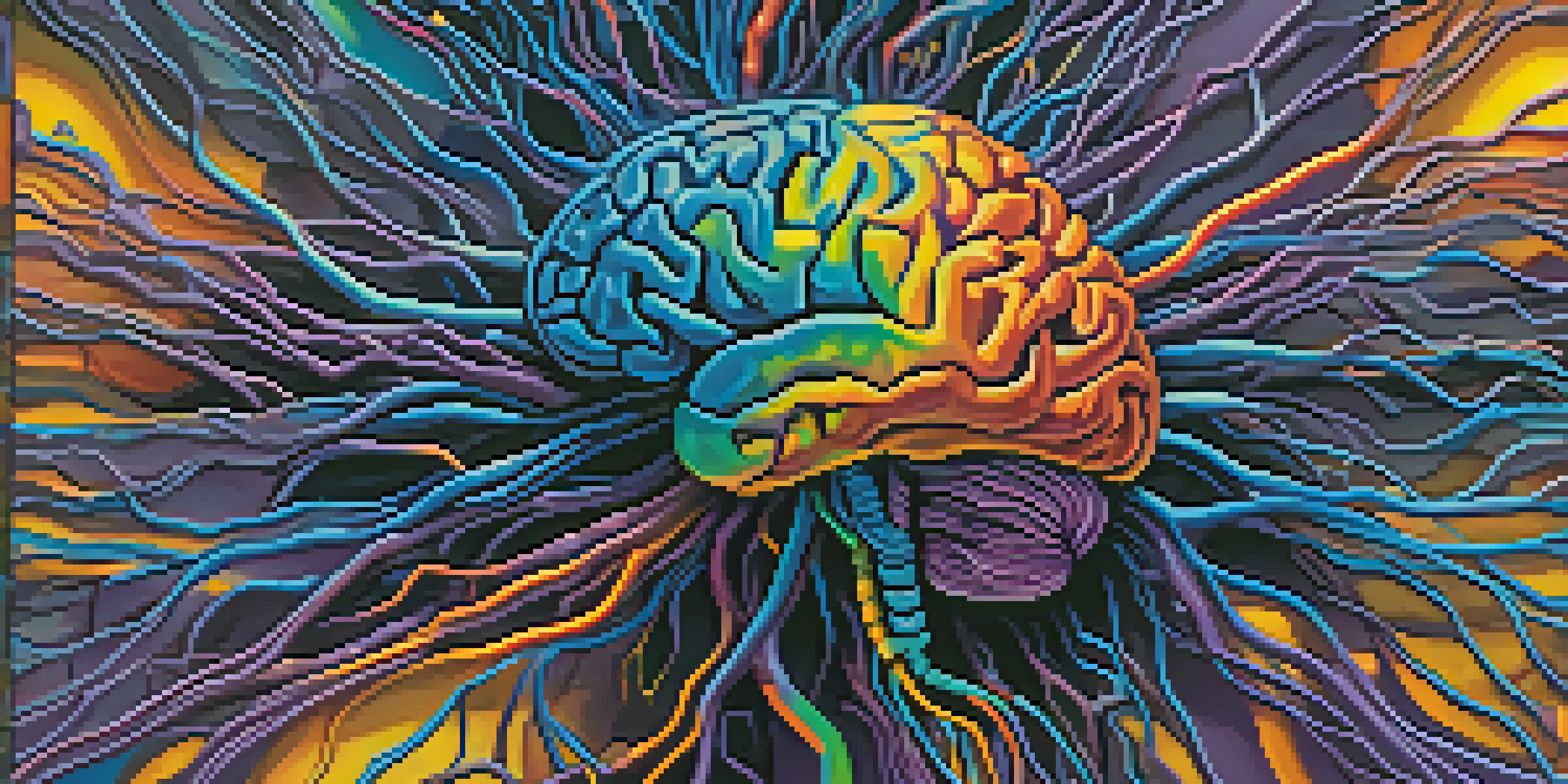The Relationship Between Entheogens and Memory Retention

What Are Entheogens and Their Historical Context?
Entheogens are substances that have been used for centuries in various cultures to enhance spiritual experiences and promote altered states of consciousness. Common examples include psilocybin mushrooms, ayahuasca, and peyote. Historically, these substances have played significant roles in rituals and healing practices, often linked to enhanced introspection and memory.
Psychedelics can help us transcend our normal way of thinking and experiencing life, allowing us to explore new avenues of creativity and insight.
In many indigenous cultures, the use of entheogens is intertwined with traditional medicine and spiritual rites. For instance, shamans utilize these substances to connect with the spiritual world, believing they can unlock deeper layers of consciousness. This historical context sets the stage for understanding how entheogens might influence cognitive functions, including memory retention.
As modern science begins to unravel the complexities of these substances, their potential effects on memory and learning have gained attention. Researchers are increasingly exploring the neurobiological mechanisms behind these experiences, aiming to bridge ancient wisdom with contemporary scientific inquiry.
The Science Behind Memory Formation
Memory formation is a complex process involving various brain regions, particularly the hippocampus, which is crucial for encoding and retrieving memories. When we learn something new, our brain creates connections between neurons, strengthening them over time. This consolidation process is essential for long-term memory retention.

Interestingly, factors such as emotion, attention, and context can significantly impact how well we remember information. For instance, a highly emotional experience can create stronger memories than an ordinary event. Understanding these factors helps us appreciate how entheogens might alter our memory processes.
Entheogens Enhance Memory Retention
Substances like psilocybin and ayahuasca may improve memory by fostering neuroplasticity and emotional experiences.
Research suggests that entheogens may interact with neurotransmitter systems, such as serotonin, which plays a vital role in mood regulation and cognition. By enhancing emotional experiences and shifting perceptions, these substances could potentially influence how memories are formed and retained.
How Entheogens Affect Neuroplasticity
Neuroplasticity refers to the brain's ability to reorganize itself by forming new neural connections throughout life. This remarkable adaptability is essential for learning, memory, and recovery from injury. Entheogens have been shown to promote neuroplasticity, which could have significant implications for memory retention.
The mind is like water. When it’s turbulent, it’s difficult to see. When it’s calm, everything becomes clear.
For example, studies on substances like psilocybin indicate they may encourage the growth of dendritic spines—small protrusions on neurons that facilitate communication between them. This growth can enhance cognitive flexibility, making it easier to learn and remember new information.
By fostering an environment conducive to neuroplasticity, entheogens might not only enhance memory retention but also help individuals overcome cognitive deficits. This potential has sparked interest in therapeutic applications, particularly in treating conditions such as PTSD and depression.
The Role of Emotional Experiences in Memory
Emotions play a critical role in memory retention, often acting as a catalyst for stronger recall. When we experience heightened emotions, whether from joy, fear, or awe, our brains prioritize those memories, making them more vivid. Entheogens can amplify emotional experiences, leading to potentially lasting impacts on memory.
For instance, a user of ayahuasca might undergo profound emotional insights during their journey, which can lead to significant personal revelations. These intense emotional states could enhance memory encoding, allowing individuals to retain these insights long after the experience.
Therapeutic Potential for Disorders
Entheogens show promise in treating conditions like PTSD and depression by helping patients process traumatic memories.
Moreover, the emotional context provided by entheogens can create a unique framework for remembering experiences. When individuals revisit these memories, the associated emotions might resurface, further strengthening the recall process.
Potential Therapeutic Uses of Entheogens
The therapeutic potential of entheogens is gaining traction, particularly in the context of memory-related disorders. Research indicates that substances like psilocybin and MDMA could aid in treating PTSD by helping patients reprocess traumatic memories in a safe environment. This reprocessing may lead to improved memory retention of therapeutic insights.
Additionally, individuals struggling with depression often have impaired memory functions. By addressing underlying emotional issues, entheogens may help restore cognitive functions, including memory. This avenue of research offers hope for those seeking alternative treatments for mental health conditions.
As more studies emerge, the potential for entheogens to enhance memory retention in therapeutic settings becomes increasingly evident. However, more research is needed to fully understand their mechanisms and long-term effects.
Challenges and Risks of Using Entheogens
While the potential benefits of entheogens are promising, it's essential to recognize the challenges and risks associated with their use. Not everyone will experience positive effects; adverse reactions can occur, including anxiety, paranoia, and confusion. These risks underscore the importance of a controlled and guided environment when using entheogens.
Additionally, the legal status of many entheogens can pose another barrier to research and therapeutic applications. In some regions, these substances remain illegal, limiting access for individuals who could benefit from their effects. Advocating for policy changes can help open new avenues for research and responsible use.
Risks and Challenges Remain
The use of entheogens carries risks such as anxiety and legal barriers, highlighting the need for guided environments.
It's crucial for anyone considering entheogen use to approach it with caution and awareness. Engaging with trained professionals and understanding individual health conditions can mitigate risks and enhance the potential for positive outcomes.
Conclusion: A New Perspective on Memory Retention
The relationship between entheogens and memory retention is a fascinating area of study that intertwines ancient wisdom with modern science. As we learn more about how these substances affect our brains, we gain insights into the intricate processes of memory formation and retention. The potential therapeutic benefits could revolutionize how we approach mental health and cognitive enhancement.
While the journey into this field is still in its early stages, the evidence suggests that entheogens could play a unique role in reshaping our understanding of memory. By fostering neuroplasticity and enhancing emotional experiences, they may provide new strategies for effective learning and memory retention.

As we continue to explore this relationship, it’s essential to approach the topic with openness and respect for both the science and the cultural significance of entheogens. Embracing this holistic view may lead to innovative solutions for enhancing memory and overall mental well-being.